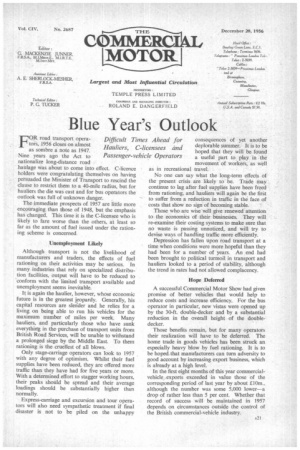Blue Year's Outlook
Page 23

If you've noticed an error in this article please click here to report it so we can fix it.
FOR road transport operators, 1956 closes on almost as sombre a note as 1947. Nine years ago the Act to nationalize long-distance road haulage was about to come into effect, C-licence holders were congratulating themselves on having persuaded the Minister of Transport to rescind the clause to restrict them to a 40-mile radius, but for hauliers the die was cast and for bus operators the outlook was full of unknown danger.
The immediate prospects of 1957 are little more encouraging than those of 1948, but the emphasis has changed. This time it is the C-licensee who is likely to fare worse than the others, at least so far as the amount of fuel issued under the rationing scheme is concerned.
Unemployment Likely Although transport is not the livelihood of manufacturers and traders, the effects of fuel rationing on their activities may be serious. In many industries that rely on specialized distribution facilities, output will have to be reduced to 'conform with the limited transport available and unemployment seems inevitable.
It is again the haulier, however, whose economic future is in the greatest jeopardy. Generally, his capital resources are slender and he relies for a living on being able to run his vehicles for the maximum number of miles per week. Many hauliers, and particularly those who have sunk everything in the purchase of transport units from British Road Services, will be unable to withstand a prolonged siege by the Middle East. To them rationing is the cruellest of all blows.
Only stage-carriage operators can look to 1957 with any degree of optimism. Whilst their fuel supplies have been reduced, they are offered more traffic than they have had for five years or more. With a determined effort to stagger working hours, their peaks shoUld be spread and their average loadings should be substantially higher than normally.
Express-carriage and excursion and tour operators will also need sympathetic treatment if final disaster is not to be piled on the unhappy consequences of yet another deplorable summer. It is to be hoped that they will be found a useful part to play in the movement of workers, as well as in recreational travel.
No one can say what the long-term effects of the present crisis are likely to be. Trade may continue to lag after fuel supplies have been freed from rationing, and hauliers will again be the first to suffer from a reduction in traffic in the face of costs that show no sign of becoming stable.
Those who are wise'will give renewed attention to the economics of their businesses. They will re-examine their costing systems to make sure that no waste is passing unnoticed, and will try to devise ways of handling traffic more efficiently.
Depression has fallen upon road transport at a time when conditions were more hopeful than they had been for a number of years. An end had been brought to political turmoil in transport and hauliers looked to a period of stability, although the trend in rates had not allowed complacency.
Hope Deferred A successful Commercial Motor Show had given promise of better vehicles that would help to reduce costs and increase efficiency. For the bus operator in particular, new vistas were opened up by the 30-ft. double-decker and by a substantial reduction in the overall height of the doubledecker.
Those benefits remain, but for many operators their realization will have to be deferred. The home trade in goods vehicles has been struck an especially heavy blow by fuel rationing. It is to be hoped that manufacturers can turn adversity to good account by increasing export business, which is already at a high level.
In the first eight months of this year commercialvehicle/ exports exceeded in value those of the corresponding period of last year by about £10m., although the number was some 5,000 lower—a drop of rather less than 5 per cent. Whether that record of success will be maintained in 1957 depends on circumstances outside the control of the British commercial-vehicle industry.




















































































